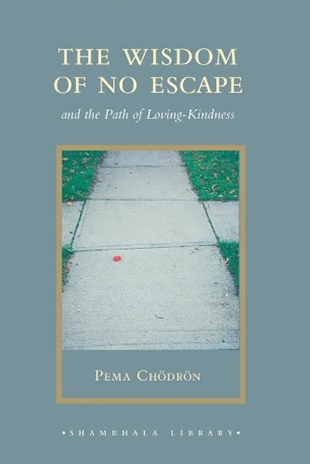Pema Chodron is a an American Buddhist nun and one of the foremost students of Chogyam Trungpa, who appointed her in 1986 to be the director of Gampo Abbey, a Buddhist monastery for Western men and women in Cape Breton, Nova Scotia. The material in this book consists of talks given by her during a one-month practice period in the spring of 1989. Participants were exhorted "to remain wholeheartedly awake to everything that occurred and to use the abundant material of daily life as their primary teacher and guide." That approach appeals to us since where we are right now is all that is important.
In a talk titled "Satisfaction," Chodron explains a linchpin of Buddhism:
"Being satisfied with what we already have is a magical golden key to being alive in a full, unrestricted, and inspired way. One of the major obstacles to what is traditionally called enlightenment is resentment, feeling cheated, holding a grudge about who you are, where you are, what you are. This is why we talk so much about making friends with ourselves, because, for some reason or other, we don't feel that kind of satisfaction in a full and complete way. Meditation is a process of lightening up, of trusting the basic goodness of what we have and who we are, and of realizing that any wisdom that exists, exists in what we already have."
This is a hard lesson for us to handle given all the input from ourselves, our families, and our culture that we are not good enough or smart enough or accomplished enough or attractive enough. We expend a phenomenal amount of energy trying to improve ourselves instead of befriending who we are and cherishing what we already have. It is difficult to let go of the story that we must always be improving ourselves. That is a belief that limits our experience of life and often closes us off to an acceptance and an appreciation of our own inner beauty and wealth. Chodron suggests that meditation gives us practice in "lightening up" and being more playful and curious. Loving self enables us to love others. Chodron also believes that meditation enables us to cultivate precision, gentleness, and an ability to let go of small-mindedness.
In other chapters, Chodron explains the Four Noble Truths, taking refuge, tonglen as a practice that encourages fearlessness, and experiencing the dharma. We were especially impressed with her takes on inconvenience and on the acceptance of impermanence as a teacher of the fleeting quality of life. She quotes Suzuki Roshi who gave the instructions, "Sit still. Don't anticipate. Just be willing to die over and over again." And then Chodron adds: "Let that be a reminder. Being willing to die over and over again heightens the first reminder, the sense of gratitude and preciousness. Impermanence can teach you a lot about how to cheer up." There are so many spiritual teachers in what is going on within and around us. Chodron beckons us to be more alert, more open, and more curious.
